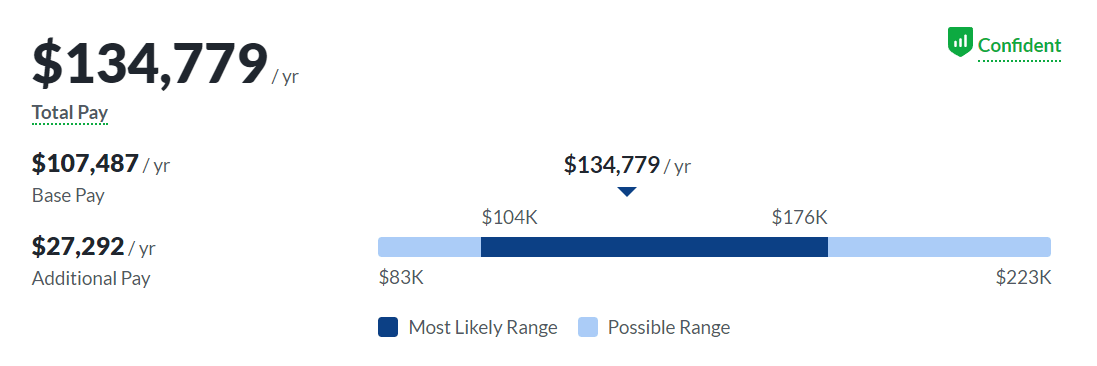
Highest Paying Data Analytics Jobs in the DMV
Because businesses around the world are increasingly relying on data-driven decisions, the data analytics industry is currently growing at an astounding rate of 30% per year. This growth means two things for data analysts: more jobs, and higher compensation.
While the continued increase in demand for data analysts is great for the industry as a whole, this doesn’t mean all data analysts are paid equally. The difference in salary for certain roles can be extreme. Some in the industry are making as much as $250,000, while others are just cracking $50,000. In this guide, we’ll shed some light on the best-paid data analytics roles in the greater Washington D.C. area, also known as DMV (D.C., Maryland, Virginia).
Is It Hard to Land a Data Analytics Job in Northern Virginia?
As one of the best-paying areas in the U.S., Northern Virginia can have high levels of competition among young data professionals, making it potentially difficult to land your first job. However, with the large numbers of both government and independent agencies operating in the greater Washington D.C. area, there are plenty of data analytics opportunities to pursue if you know how and where to look.
Highest Paying Data Analytics Jobs in Washington D.C., Maryland, and Virginia
Data analysts have access to a truly staggering array of career options. Their skill set can be quite broad and they remain applicable across a wide range of verticals, meaning they have many choices when it ultimately comes to pursuing their career. Here are some of the most lucrative options:
Data Warehouse Architect

Data warehouse architects are analytical experts who are tasked with creating and maintaining data warehouses. A data warehouse is, as the name might imply, a system that is chiefly designed to store relevant data from any given system. Increasingly, these data warehouses are being developed with user functionality in mind, meaning they are designed to be more readily searched through and understood by stakeholders.
Average salary range in DMV: $117,000 - $183,000
Data Engineer

Similarly, data engineers are tasked with building systems that manage company data. The exact kind of system varies from business to business, but such databases are typically less complex than a full data warehouse and may not require a user-friendly design. Nevertheless, a data engineer may be tasked with organizing and maintaining several such systems, making sure that a business has consistent access to the kinds of data they might need to make better business decisions.
Average salary range in DMV: $85,000 - $138,000
Quantitative Analyst

Quantitative analysts build statistical models that can help predict the results of individual business decisions, ultimately helping to guide a business down the safest possible, predictable path. This work typically means designing software that will run simulations, meaning that a quantitative analyst must possess an understanding of both data analytics and software programming.
Average salary range in DMV: $102,000 - $168,000
SQL Developer

Coding experts who make use of a Structured Query Language are known as SQL developers. SQL is the most common form of programming language employed by modern databases, meaning many analytical experts must also familiarize themselves with this form of programming. This code may be used to help build organizational systems or to help data analysts get more ready access to user data.
Average salary range in DMV: $77,000 - $115,000
Software Engineer

Software engineers employ data analytics to craft organizational systems that examine key data sets. This kind of engineering position is therefore a natural offshoot for data analytics experts, though it is not upcoming for this kind of work to be done as a freelance service across multiple industries.
Average salary range in DMV: $80,000 - $130,000
Database Developer

Database developers are tasked with building systems that organize a range of data types. These coding professionals reduce overhead by streamlining data organizing processes, making it easier for a business to access the information they need. This kind of optimization can be key for a business to achieve overall success, making this a much-in-demand position.
Average salary range in DMV: $68,000 - $103,000
Principal Data Analyst

As experienced and skilled data analysts gain a reputation, they can earn titles such as “staff” or “principal” that increase their influence and salary. You can earn these titles either as an individual contributor or a manager and for a range of skills such as technical, product, or managerial expertise.
Average salary range in DMV: $104,000 - $176,000
Entry-Level Data Analytics Jobs in DC, Maryland, and Virginia?
There are also ample opportunities for junior data analysts in DMV. Thanks to all the data wrangling, monitoring, and debugging required during any project, juniors are an indispensable part of the team.
Junior Business Analyst

Source: Glassdoor
A business analyst is almost identical to a data analyst in many cases, with their title specifying that the role will focus solely on analyzing data for business needs. Companies produce and collect so much data that there are plenty of projects perfectly suited for more junior members.
Average junior salary range in DMV: $61,000 - $93,000
Cost Data Analyst, Junior

Source: Glassdoor
Cost analysts specialize in using data to produce insights about budgets and how they can be tweaked and improved. Data analysis can show where inefficient or redundant spending is happening and point out various ways to save money or redirect it to better uses.
Average junior salary range in DMV: $66,000 - $95,000
Junior Quantitative Data Analyst

Source: Glassdoor
The title of “quantitative data analyst” is essentially interchangeable with just “data analyst,” and can involve analyzing various types of data for business or product development purposes.
Average junior salary range in DMV: $76,000 - $122,000
How To Land a Data Analytics Job in Northern Virginia

There’s no one set path to becoming a data analyst in Northern Virginia, and there are more education options out there than you might think.
No Experience
Starting from scratch? Follow these steps:
Acquire the skills. If you haven’t entered the workforce yet, there are multiple full-time and part-time education options you can choose from. A university is the most traditional option. Common majors for data analysts include computer science, mathematics, and information technology. You can also study independently or enroll in an online course like the UMGC Data Analytics Bootcamp.
Create a portfolio. Before you start applying for jobs, it’s important to craft a portfolio of projects to showcase your skills to potential employers. As a junior, you can take part in volunteer, open-source, personal, or freelance projects to build up your portfolio. Make sure to include your best school and bootcamp projects too.
Find a job. Once you’re ready and graduated, you can call upon the alumni services of your educational institution, recruiting agencies, and DMV-specific job boards to start finding data analytics job openings and landing interviews.
Career Transition
Already have a career? Here’s what to do next:
Acquire the skills: If you work full-time, getting into data analytics can seem daunting. Luckily, there are ways to study around your work schedule without having to quit your job or even cut back on your hours. Online analytics bootcamps are specifically designed to help professionals transition into new careers, and they can get the job done in under a year.
Create a portfolio: If you do a bootcamp, make sure to add these projects to your portfolio. You can develop your portfolio even further with personal, open-source, and freelance projects too. Portfolios are all about showcasing your skills and there’s no wrong way to build one. Just make sure that you’re showcasing your best work.
Find a job: If you go the bootcamp route, lean on their career services to help you prepare for the job search, practice interviews, and write the perfect resume. Data analytics is important for many industries, so whatever your previous career, you may be able to leverage your existing network to find some openings. DMV-specific job boards and recruitment agencies are good options too.
What Companies Are Hiring Data Analysts in DMV?

These companies are looking to hire data analysts today:
Booz Allen Hamilton
A military and government contractor specializing in intelligence and headquartered in Washington D.C., Booz Allen Hamilton often recruits new analytics talent.
United States Postal Service
Also headquartered in D.C., the United States Postal Service has various openings for data professionals.
Homeland Security and EMA
It’s no surprise that data collection and analysis are important to Homeland Security and EMA. Working with the government can be a great choice for anyone who wants to analyze data for purposes other than business insights.
U.S. Department of State
There are many other federal agencies that hire data analysts and Washington D.C. is where the majority of them are based. The U.S. State Department is just one of many.
FAQs About Data Analysis in DMV
We’ve got the answers to your most frequently asked questions.
Is Data Analysis a Good Career in Northern Virginia?
While Northern Virginia doesn’t have as many data analytics jobs as California, the salaries are often comparable, and with a much lower cost of living. With so many jobs available within the federal government, it’s a particularly good area for data professionals that want to expand beyond business analytics.
Can I Get Into Data Analytics Without a Degree?
The only real barrier to data analytics is the foundational knowledge in mathematics that’s required for most technical roles. This level of statistics and linear algebra is typically only studied in college, but a degree isn’t necessary. If you can study these subjects independently and showcase the essential skills, you’ll be able to start enrolling in online courses and bootcamps that can lead to a job in no time.
Is It Hard To Get a Data Analysis Job Without Experience?
There are lots of junior positions in the data analytics industry because there’s so much wrangling and debugging that needs to be done to analyze any given data set. This makes it easier for juniors to get their first role, although it’s best to gain as much experience as you can beforehand. Personal projects, freelance, volunteer, or open-source work, and internships can all help with this.
